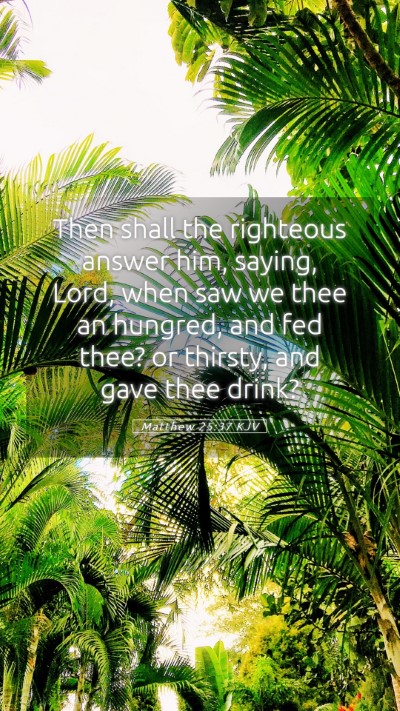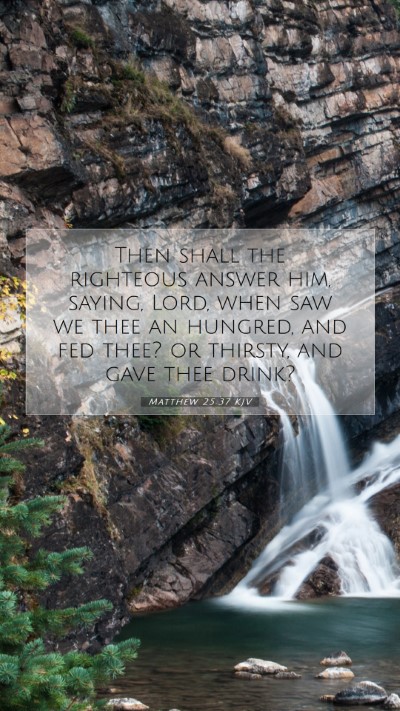Bible Verse Meaning: Matthew 25:37
Verse: "Then shall the righteous answer Him, saying, Lord, when saw we thee an hungred, and fed thee? or thirsty, and gave thee drink?" (Matthew 25:37)
Summary of Biblical Commentary
This verse is a part of Jesus' parable regarding the final judgment, where He emphasizes the importance of acts of mercy and compassion toward others as a reflection of one’s relationship with Him. The righteous, also referred to as "the sheep," question the Lord about their acts of kindness, indicating humility and a lack of awareness of their good deeds.
Insights from Public Domain Commentaries
-
Matthew Henry's Commentary:
Henry emphasizes that the righteous exhibit genuine surprise when recognizing their deeds of kindness. They did not perform acts of service for glory or recognition but out of an intrinsic love for God and humanity. This response highlights their humility and underscores that their actions were motivated by righteousness rather than self-interest.
-
Albert Barnes' Notes:
Barnes points out that the question posed by the righteous in this verse reflects their lack of expectation that their actions would be linked to their salvation. They had treated others with kindness as a natural expression of their faith, demonstrating that true righteousness is often unrecognized by the righteous themselves.
-
Adam Clarke's Commentary:
Clarke elaborates on the theme of awareness and perception in this verse. The righteous are depicted as perplexed, suggesting that their kindness to the afflicted was done without seeking acknowledgment. Clarke also emphasizes that this passage illustrates the profound connection between our service to others and our relationship with Christ.
Understanding the Broader Context
Matthew 25:37 is situated within a larger discourse Jesus delivers about the end times, focusing on accountability and stewardship. The verses that follow further illustrate how treating the marginalized is tantamount to serving Christ Himself. This teaching is pivotal in understanding the practical applications of love and kindness in the context of faith.
Application of the Verse
This verse prompts readers to reflect on their own behaviors and attitudes towards serving others. It serves as a reminder of the significance of unseen acts of generosity and the expectation that such deeds are integral to the Christian faith. As believers engage in Bible study and scripture analysis, the passage encourages them to find practical ways to incorporate compassionate actions into their daily lives.
Related Biblical Cross References
- Matthew 25:40 – "And the King shall answer and say unto them, Verily I say unto you, Inasmuch as ye have done it unto one of the least of these my brethren, ye have done it unto me."
- Luke 3:11 – "He answered and saith unto them, He that hath two coats, let him impart to him that hath none; and he that hath meat, let him do likewise."
- James 2:15-16 – "If a brother or sister be naked, and destitute of daily food, and one of you say unto them, Depart in peace, be ye warmed and filled; notwithstanding ye give them not those things which are needful to the body; what doth it profit?"
- 1 John 3:17 – "But whoso hath this world's good, and seeth his brother have need, and shutteth up his bowels of compassion from him, how dwelleth the love of God in him?"
- Proverbs 19:17 – "He that hath pity upon the poor lendeth unto the Lord; and that which he hath given will he pay him again."
Conclusion
In conclusion, Matthew 25:37 challenges believers to cultivate a compassionate heart and serve others without seeking recognition. Understanding this verse through the insights of biblical commentaries can deepen one's Bible study insights and enhance appreciation for the significance of serving others as a reflection of one’s faith. Engaging in further study and group discussions on this and related passages can lead to a more profound application of Christ's teachings in everyday life, reinforcing the core principle that our service to others is ultimately service to God.


